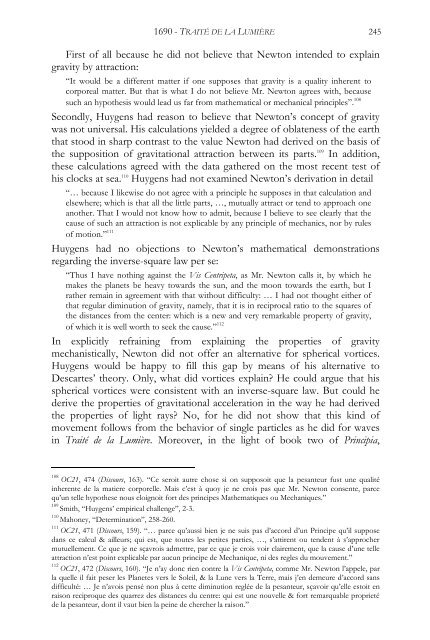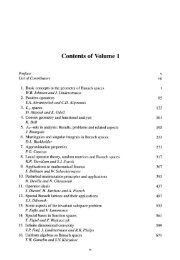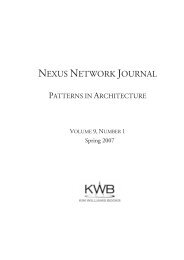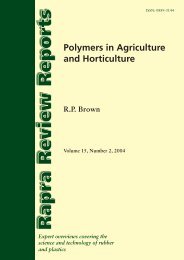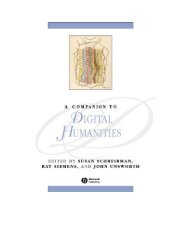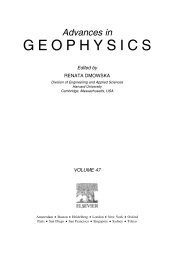Lenses and Waves
Lenses and Waves
Lenses and Waves
Create successful ePaper yourself
Turn your PDF publications into a flip-book with our unique Google optimized e-Paper software.
1690 - TRAITÉ DE LA LUMIÈRE 245<br />
First of all because he did not believe that Newton intended to explain<br />
gravity by attraction:<br />
“It would be a different matter if one supposes that gravity is a quality inherent to<br />
corporeal matter. But that is what I do not believe Mr. Newton agrees with, because<br />
such an hypothesis would lead us far from mathematical or mechanical principles”. 108<br />
Secondly, Huygens had reason to believe that Newton’s concept of gravity<br />
was not universal. His calculations yielded a degree of oblateness of the earth<br />
that stood in sharp contrast to the value Newton had derived on the basis of<br />
the supposition of gravitational attraction between its parts. 109 In addition,<br />
these calculations agreed with the data gathered on the most recent test of<br />
his clocks at sea. 110 Huygens had not examined Newton’s derivation in detail<br />
“… because I likewise do not agree with a principle he supposes in that calculation <strong>and</strong><br />
elsewhere; which is that all the little parts, …, mutually attract or tend to approach one<br />
another. That I would not know how to admit, because I believe to see clearly that the<br />
cause of such an attraction is not explicable by any principle of mechanics, nor by rules<br />
of motion.” 111<br />
Huygens had no objections to Newton’s mathematical demonstrations<br />
regarding the inverse-square law per se:<br />
“Thus I have nothing against the Vis Centripeta, as Mr. Newton calls it, by which he<br />
makes the planets be heavy towards the sun, <strong>and</strong> the moon towards the earth, but I<br />
rather remain in agreement with that without difficulty: … I had not thought either of<br />
that regular diminution of gravity, namely, that it is in reciprocal ratio to the squares of<br />
the distances from the center: which is a new <strong>and</strong> very remarkable property of gravity,<br />
of which it is well worth to seek the cause.” 112<br />
In explicitly refraining from explaining the properties of gravity<br />
mechanistically, Newton did not offer an alternative for spherical vortices.<br />
Huygens would be happy to fill this gap by means of his alternative to<br />
Descartes’ theory. Only, what did vortices explain? He could argue that his<br />
spherical vortices were consistent with an inverse-square law. But could he<br />
derive the properties of gravitational acceleration in the way he had derived<br />
the properties of light rays? No, for he did not show that this kind of<br />
movement follows from the behavior of single particles as he did for waves<br />
in Traité de la Lumière. Moreover, in the light of book two of Principia,<br />
108<br />
OC21, 474 (Discours, 163). “Ce seroit autre chose si on supposoit que la pesanteur fust une qualité<br />
inherente de la matiere corporelle. Mais c’est à quoy je ne crois pas que Mr. Newton consente, parce<br />
qu’un telle hypothese nous eloignoit fort des principes Mathematiques ou Mechaniques.”<br />
109<br />
Smith, “Huygens’ empirical challenge”, 2-3.<br />
110<br />
Mahoney, “Determination”, 258-260.<br />
111<br />
OC21, 471 (Discours, 159). “… parce qu’aussi bien je ne suis pas d’accord d’un Principe qu’il suppose<br />
dans ce calcul & ailleurs; qui est, que toutes les petites parties, …, s’attirent ou tendent à s’approcher<br />
mutuellement. Ce que je ne sçavrois admettre, par ce que je crois voir clairement, que la cause d’une telle<br />
attraction n’est point explicable par aucun principe de Mechanique, ni des regles du mouvement.”<br />
112<br />
OC21, 472 (Discours, 160). “Je n’ay donc rien contre la Vis Centripeta, comme Mr. Newton l’appele, par<br />
la quelle il fait peser les Planetes vers le Soleil, & la Lune vers la Terre, mais j’en demeure d’accord sans<br />
difficulté: … Je n’avois pensé non plus à cette diminution reglée de la pesanteur, sçavoir qu’elle estoit en<br />
raison reciproque des quarrez des distances du centre: qui est une nouvelle & fort remarquable proprieté<br />
de la pesanteur, dont il vaut bien la peine de chercher la raison.”


